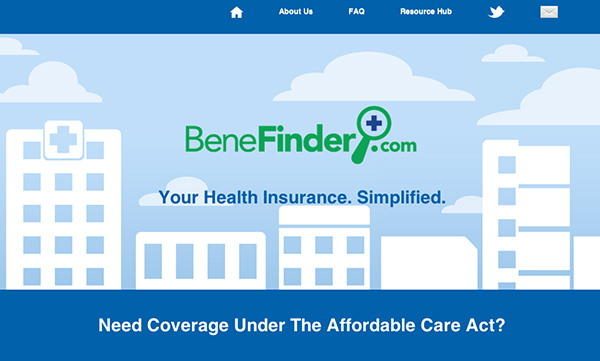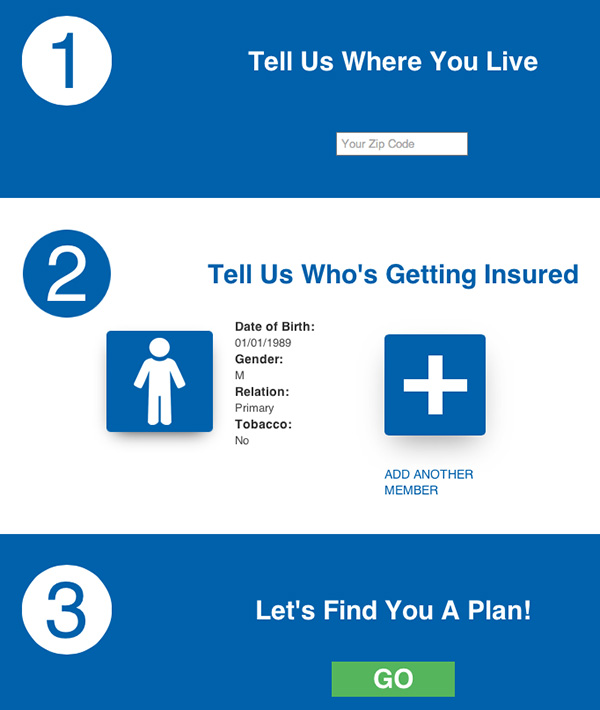Where others saw confusion and controversy in the rollout of HealthCare.gov, David Blanchard saw an opportunity.
Blanchard in November launched BeneFinder.com, a startup that’s looking to capitalize on and act as a private sector alternative to the federal government’s much maligned health insurance marketplace website.
BeneFinder, headquartered at 1906 N. Hamilton St., aims to be to health insurance what Kayak is for airfare.
Users can find and compare plans from Anthem Blue Cross and Blue Shield, CoventryOne, Aetna and Optima Health on BeneFinder, and Blanchard said Kaiser Permanente and Carefirst Blue Cross Blue Shield policies would be available soon. Blanchard said that plans available on the federal exchange marketplace would be available on BeneFinder, too.
The company is targeting only Virginia for now. Blanchard is a one-man show, managing the business and handling calls on the BeneFinder hotline.
“I’m the scrappy Virginia-only guy that offers guidance,” Blanchard said, adding that he hopes to set up a Richmond-based call center with multiple people working the phones.
Users that fill out a profile and register with BeneFinder receive scores for different health insurance policies. The scores represent estimates of the long-term costs for each policy available through the site.
Registering on BeneFinder.com is free, and so is assistance with policies, claims and general questions offered mainly through email and by phone.
The startup makes its money through broker fees that are built into the price of health insurance policies.
Blanchard, who has 11 years of experience in the health insurance industry, said that health insurance companies include a broker’s fee in the total cost of the policies they offer, regardless of whether a broker is used. If a consumer signs up for a policy without using a broker, the insurance company pockets what otherwise would have gone to a broker.
Health insurance companies “see a broker as a . . . distribution model to help facilitate enrollment in their plans,” Blanchard said. “There’s sort of no reason not to use a broker of some sort.”
There’s plenty of potential market dollars for Blanchard to capture. He said there are about 2 million people that buy individual insurance plans in Virginia. The average cost for an individual health policy is about $250 a month, and the average broker’s commission is $18 a month for the first year and $9 a month for subsequent years, he said. That amounts to a potential market of about $400 million in first-year broker’s fees that is up for grabs, he said.
With the ongoing efforts to improve the government’s health-care website and the postponement of the small business health insurance marketplace, Blanchard’s career change is timely but not without years of planning.
The ’01 UVA graduate got his start in the health insurance industry about a year after college, getting a front row seat to health insurance enrollment.
“It’s a terrifying process. People feel trapped in a confusing world of stupid terms,” Blanchard said. “I surprisingly enjoyed helping people navigate through a broken system.”
Blanchard, 36, said he was motivated to start BeneFinder because he saw people who didn’t fit traditional models fall through the cracks and because he felt like people weren’t getting the most for their money when they did purchase insurance.
“[Consumers] shop by price only,” Blanchard said. “They go with the cheapest price but not the best value.”
When the individual health insurance mandate was deemed constitutional by the Supreme Court in 2012, Blanchard was confident that the conditions were right to start his website.
He hired Richmond-based IT firm EvenSpring in August 2013 to help develop a unique algorithm to calculate a person’s long-term spending for a given policy.
Blanchard said developing the algorithm has by far been his biggest expense, “a significant investment” that he would not disclose.
BeneFinder has fewer than 100 registered users, but Blanchard said that number is rising. He expects activity to pick up as it gets closer to Dec. 23, the purchase deadline for individual policies to go into effect on Jan. 1 under the federal mandate.
“People don’t want to pull the trigger yet, because they want to see what changes the government might make,” Blanchard said.
Blanchard faces competition from other independent brokers and from companies such as eHealthInsurance.com and the Virginia Health Insurance Exchange, another privately owned broker. The first-time entrepreneur is hoping to achieve “a Zappos level of respected customer service” to set himself apart.
Blanchard said the BeneFinder model could work beyond Virginia.
“It’s a scalable concept that could go nationwide,” Blanchard said. “People need the help.”
Where others saw confusion and controversy in the rollout of HealthCare.gov, David Blanchard saw an opportunity.
Blanchard in November launched BeneFinder.com, a startup that’s looking to capitalize on and act as a private sector alternative to the federal government’s much maligned health insurance marketplace website.
BeneFinder, headquartered at 1906 N. Hamilton St., aims to be to health insurance what Kayak is for airfare.
Users can find and compare plans from Anthem Blue Cross and Blue Shield, CoventryOne, Aetna and Optima Health on BeneFinder, and Blanchard said Kaiser Permanente and Carefirst Blue Cross Blue Shield policies would be available soon. Blanchard said that plans available on the federal exchange marketplace would be available on BeneFinder, too.
The company is targeting only Virginia for now. Blanchard is a one-man show, managing the business and handling calls on the BeneFinder hotline.
“I’m the scrappy Virginia-only guy that offers guidance,” Blanchard said, adding that he hopes to set up a Richmond-based call center with multiple people working the phones.
Users that fill out a profile and register with BeneFinder receive scores for different health insurance policies. The scores represent estimates of the long-term costs for each policy available through the site.
Registering on BeneFinder.com is free, and so is assistance with policies, claims and general questions offered mainly through email and by phone.
The startup makes its money through broker fees that are built into the price of health insurance policies.
Blanchard, who has 11 years of experience in the health insurance industry, said that health insurance companies include a broker’s fee in the total cost of the policies they offer, regardless of whether a broker is used. If a consumer signs up for a policy without using a broker, the insurance company pockets what otherwise would have gone to a broker.
Health insurance companies “see a broker as a . . . distribution model to help facilitate enrollment in their plans,” Blanchard said. “There’s sort of no reason not to use a broker of some sort.”
There’s plenty of potential market dollars for Blanchard to capture. He said there are about 2 million people that buy individual insurance plans in Virginia. The average cost for an individual health policy is about $250 a month, and the average broker’s commission is $18 a month for the first year and $9 a month for subsequent years, he said. That amounts to a potential market of about $400 million in first-year broker’s fees that is up for grabs, he said.
With the ongoing efforts to improve the government’s health-care website and the postponement of the small business health insurance marketplace, Blanchard’s career change is timely but not without years of planning.
The ’01 UVA graduate got his start in the health insurance industry about a year after college, getting a front row seat to health insurance enrollment.
“It’s a terrifying process. People feel trapped in a confusing world of stupid terms,” Blanchard said. “I surprisingly enjoyed helping people navigate through a broken system.”
Blanchard, 36, said he was motivated to start BeneFinder because he saw people who didn’t fit traditional models fall through the cracks and because he felt like people weren’t getting the most for their money when they did purchase insurance.
“[Consumers] shop by price only,” Blanchard said. “They go with the cheapest price but not the best value.”
When the individual health insurance mandate was deemed constitutional by the Supreme Court in 2012, Blanchard was confident that the conditions were right to start his website.
He hired Richmond-based IT firm EvenSpring in August 2013 to help develop a unique algorithm to calculate a person’s long-term spending for a given policy.
Blanchard said developing the algorithm has by far been his biggest expense, “a significant investment” that he would not disclose.
BeneFinder has fewer than 100 registered users, but Blanchard said that number is rising. He expects activity to pick up as it gets closer to Dec. 23, the purchase deadline for individual policies to go into effect on Jan. 1 under the federal mandate.
“People don’t want to pull the trigger yet, because they want to see what changes the government might make,” Blanchard said.
Blanchard faces competition from other independent brokers and from companies such as eHealthInsurance.com and the Virginia Health Insurance Exchange, another privately owned broker. The first-time entrepreneur is hoping to achieve “a Zappos level of respected customer service” to set himself apart.
Blanchard said the BeneFinder model could work beyond Virginia.
“It’s a scalable concept that could go nationwide,” Blanchard said. “People need the help.”



I have had the privilege of working with David for the past six years. He has an amazing wealth of knowledge and range of experience – plus he listens to, and cares about, his client. His business plan is visionary and just what the market needs. Go, David, go!